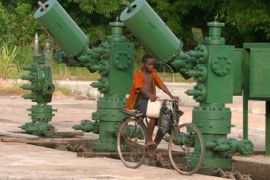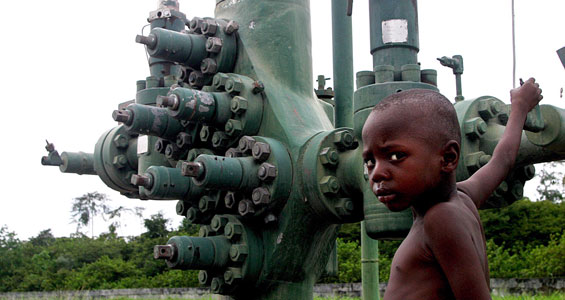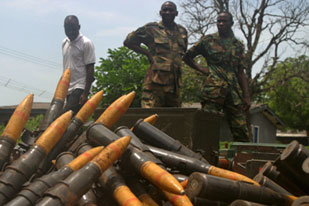Poor miss out on Nigeria oil riches
Failure to lift many out of poverty despite huge oil revenues fuels unrest.

 |
| Despite billions of dollars of oil revenues, many people still live on less than $1 a day [EPA] |
Nigeria is the world’s sixth largest oil producer, but this wealth has done little to alleviate poverty in the country.
High unemployment, particularly among young men, means that about 70 per cent of the country’s population live on less than $1 a day and one-third live below the national poverty line.
A briefing by the US Council on Foreign Relations in 2006 said that few Nigerians had benefited since oil exploration began in the 1970s because the distribution of revenues has been undermined by corruption and mismanagement.
Nigeria was ranked joint 142nd out of 163 countries in Transparency International’s 2006 Corruption Perceptions Index.
The oil industry is concentrated in the southern delta region, with multinationals such as Royal Dutch Shell, ExxonMobil, Chevron and Total operating in the area.
Output slashed
However, production has been slashed in recent years as armed groups have stepped up attacks on oil facilities and kidnapped oil workers.
In May 2009, Nigeria said output was down to 1.6 million barrels a day, about half of the country’s total capacity.
One group, calling itself the Movement for the Emancipation of the Niger Delta (Mend), has carried out numerous attacks saying it wants an increased share of oil wealth for the region, compensation for oil pollution and the demilitarisation of the region.
|
“Communities in the Delta whose human rights are negatively affected by oil operations face serious difficulties in seeking remedy and redress” Amnesty International report |
A 2007 report from Human Rights Watch detailed the misuse of funds by officials in the Niger Delta and the harmful impact on basic services.
“Many state and local officials in Rivers have squandered or stolen public money that could have gone toward providing vital health and education services,” Peter Takirambudde, Human Rights Watch’s Africa director, said.
“State and local budgets have expanded dramatically in recent years, but mismanagement and theft has left basic health and education services in a terrible state of decay.”
The report quoted one resident of Rivers state as saying: “All they do is build their headquarters, massive things, air-condition them, and buy vehicles to drive around in.”
The Amnesty International human rights group has accused the government of failing to hold oil companies to account for environmental damage and the associated health problems in the Niger Delta.
“Research undertaken in March and April 2008 found that the ministry of environment in the Delta was constrained, both by law and a serious lack of resources, from enforcing environmental laws and standards to protect human rights,” it said in a report published in February 2009.
“Communities in the Delta whose human rights are negatively affected by oil operations face serious difficulties in seeking remedy and redress.”
The government has called the armed groups “rascals” and common criminals, while moving huge numbers of military personnel, naval vessels and aircraft into the Niger Delta in an attempt to protect oil exports.
Executions and torture
But alleged human rights abuses by the military have further turned the population against the government.
 |
| Rights groups have accused Nigeria’s military of abuses in the Niger Delta [EPA] |
Amnesty International said there were detailed accusations of “extrajudicial executions, torture and other ill-treatment”.
“Rape is at times used to coerce and intimidate entire communities, including by security forces deployed in the Niger Delta,” the February 2009 report said.
Many analysts suggest that the tit-for-tat violence will not be stopped without improved governance, free and fair elections, and public provision of services such as water, electricity, roads and education.
The combination of oil and poverty has also led to tragic accidents as ordinary people have attempted to illegally siphon oil from pipelines.
In May 2006, more than 150 people were killed when a high-pressure pipeline exploded in a suburb of the city of Lagos, allegedly during an attempt to tap into the pipeline. At least 2,000 people have died in similar incidents in recent years.